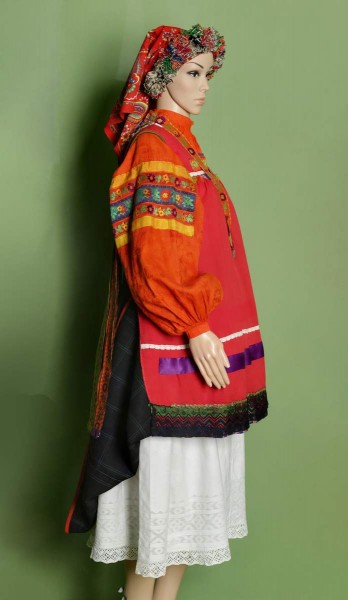Female Festive Costume
Novoyuryevo Village, Kozlov District, Tambov Gubernia. 19th century
- Red calico, half-woolen fabric, silk ribbons, stitching, wool, хлопчатобумажная ткань, weaving, linen, linen, russian lace, mill-finished fabric, galloon, тюль, beads, spangles, wool threads, silk, glass beads
- Т-5988; Т-5987; В-9732; Т-5989; Т-5991; В-9727
Shirt
Red calico, half-woolen fabric, silk ribbons, embroidery
Ponyova
Wool, cotton, weaving
Podstavok
Flax, weaving, stitch, Russian lace
Zapon
Mill-finished fabric, silk ribbons, galloon, tulle, embroidery
Zadok
Silk ribbons, beads, spangles, wool, embroidery
Headdress. Chub
1930s
Woolen threads, silk, glass beads
In central Russian and southern Russian villages the female costume was different to that of women in the North. Married women did not wear sarafans, but wore the ponyova, part of the old peasant dress. The costumes worn by young women in Kaluga, Tula, Oryol, Ryazan, Tambov and Voronezh gubernias were rare items of beauty. The costume was different in every locality in its cut, color and shape, and the headdress and accessories worn with it.
The costumes are layered. The sparkling trim and silk ribbons, the bright woolen tufts and bobbles and the color bead decorations from head to toe make up the “top layer”. The shirt sleeves are covered with embroidered cloth, in patchwork patterns, from shoulder to wrist. The hem of the shirt, visible from under the edge of the ponyova, is finished with colored lace or a patterned border. The ponyova’s rich embroidery, gold lace, braids and trim are an important part of the costume. The aprons are original in their shapes and decorations; some have sleeves, although most do not, and they are long — coming down lower than the hem of the ponyova. Aprons were opened at the back with an unusual “window” over the shoulder blades. Short, loose tops called navershniki, nasovy or golopuziki were usually sleeveless or had straps, and added the finishing touch to the complex layered composition of the costume.

